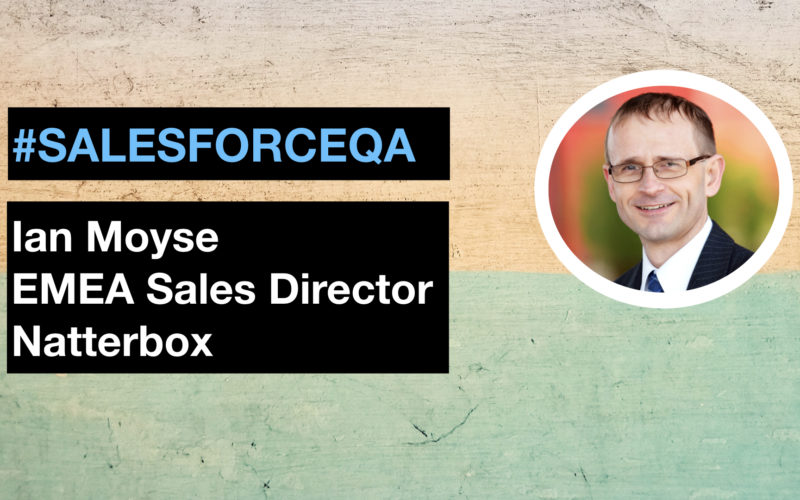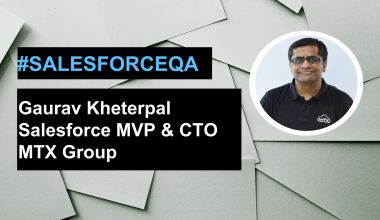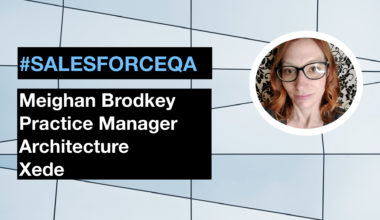In our most recent #SalesforceQA, we caught up with Ian Moyse, EMEA Sales Director at Natterbox.
Ian talks to us about the benefits and challenges of starting a career in the ecosystem. He discusses the importance of getting involved in the community and the benefits it can bring to your career. As well as, revealing his views on certifications.
Salesforce Republic (SR): You’ve had an incredibly successful career in the IT arena much of it focused around Salesforce. Could you talk us through how you got to where you are today as the EMEA Sales Director at Natterbox, as well as an advisor and Non-Exec Director?
Ian Moyse (IM): I started as a programmer at IBM. Moved through Inside Sales at an IT distributor to channel salesperson to Channel Sales Leader. I’ve also had a few positions as Country Manager / MD and today as EMEA Sales Leader. For the last 13 years, my work has been focused in the cloud computing arena.
My Salesforce involvement began when I led a startup UK operation for a USA firm and needed a CRM. At the time Salesforce offered a 5 user free starter edition so it was a no brainer to try this new cloud brand that was making some noise.
Across my career, I have used many CRM systems, with many firms utilising Salesforce. Today, as EMEA Sales Director at Natterbox, I lead a Sales team both using Salesforce, working in the Salesforce ecosystem alongside them as a partner and selling to Salesforce customers who utlise their platforms from Salescloud, ServiceCloud, Force.com and so on.
SR: In your opinion, what are some of the benefits and challenges of starting a career in the Salesforce arena?
IM: The salesforce ecosystem and Ohana is extensive, supportive and a great career opportunity. Working in the Salesforce ecosystem I have observed a comradery not seen in other vendor sectors. There’s a sense of community in every element from Salesforce ISV partners and consulting / implementation partners through to specialist recruiters in the space. It’s extensive, there are so many people involved. But, even so, it’s noticeable how many professionals know each other. The more you engage, create content and want to be involved the more you mesh into this ecosystem of people.
The challenge would be you enter a community of very experienced and well-known people who have been involved with the platform for at least 5 – 10+ years. It can be daunting to be the newbie, but you have to start somewhere. You’ll quickly find you’re embraced as part of the family and other newbies will be following behind you.
If you know Salesforce and build your Trailheads there’s a lot of opportunities to progress your career, grow your knowledge and experience, add value, as well as to travel the world. I know many Salesforce specialists who have gone from strength to strength. We see this amongst our clients, with people moving firms and reaching out to bring us into their new employer’s organisation.
SR: You’re heavily involved in the ecosystem, as a leading Cloud blogger and influencer and regularly speaking at events. Could you talk a bit about how getting involved in community events has benefitted your career?
IM: When investing their time, people all too often look at the immediate return they’re going to get. What’s the instant gratification? If they can’t see it, then they simply don’t partake.
Giving back and sharing some of your insight and experience through a blog, a podcast, speaking at events may not get you an instant measurable return. However, it does provide you with more experience. It enables you to reach an audience, build your credibility and personal brand. As well as this, you never know who may be in the audience, you might get asked to speak at another event or get invited to something you otherwise may not have. Perhaps you gain more social followers and they share your ongoing content, hence you reach a wider audience.
Using this approach I’ve grown my audience, as well as gained recommendations and have been invited to take part in a range of events and media publications. I’ve been a Social Influencer in the cloud computing sector through Sage, HP, IBM, Oracle, SAP, and Salesforce to name just a few.
SR: What are your top tips for those looking to take their career to the next level in Salesforce?
IM: I’ve seen people quickly progress their career in the ecosystem through focused effort, trailhead achievements and taking hold of their destiny. The world is your oyster in such a large and growing market segment. There’s always the opportunity to become a specialist in a given Salesforce area, such as Marketing Cloud.
There’s also plenty of opportunities to work with an end-user Salesforce team, in a Salesforce implementation partner. Which gives a wider breadth of variance across customer segments and implementation needs. There’s working for Salesforce themselves, Salesforce technology partners such as Natterbox and also specialist groups such as Salesforce Supermums.
SR: In your experience, what are the key traits needed for career advancement in the ecosystem?
IM: Understanding Ohana is a strong one. It’s the foundation of the Salesforce culture. Prepare to be inquisitive and willing to learn. The ecosystem is full of those passionate about Trailheads and getting higher up the expertise ladder. The Salesforce ecosystem is lucrative in its expansiveness, however, for the same reason, it’s very competitive. The ecosystem a great place to be if you work hard and are skilled at what you do.
SR: Do you think that Salesforce certifications are essential when it comes to success in Salesforce?
IM: Depending on your role, the level and type of certification or experience vary. There’s a lot of competition in the Salesforce eco-system due to continued rapid growth. This, therefore, demands skills both in-house and through partners to help implement, maintain and support the platform for business.
The Salesforce offering is a strategic platform for businesses and is something they’ve invested in, so you can expect them to look for quality in its expertise. After all, you don’t have a prestige car and let anyone with a spanner start working on it, you want your investment to be looked after appropriately.
Certifications are a valuable way to ratify and differentiate yourself as an individual of calibre. Certainly when you are starting out and won’t have the experience and references to lean back on. Someone seeking a role as a Salesforce Administrator who’s passed Trailheads, stands above someone with the same experience who hasn’t.
SR: Have you noticed a skills gap in the world of Salesforce? If yes, how do you think that businesses and the ecosystem as a whole can work toward closing this gap?
IM: The innovation and opportunity in Salesforce is broad and when looking at the platform’s and functional breadth, there’s a lot to cover. The gap I witness is the volume of expertise available to make Salesforce more affordable to a wider audience. We witness those wanting Salesforce skills in-house struggling to find them and at a price point they can afford. The supply and demand model is driving the cost of good Salesforce resources higher and higher.
SR: Finally, what are your predictions for the future of Salesforce?
IM: Salesforce is a powerful brand, technology and has a strong band of passionate followers. Salesforce has a growing number of competitors from the likes of ServiceNow on the service side to Microsoft Dynamics on the Sales CRM side. It’s also rumored that Salesforce is to be a target acquisition of one of the cloud giants such as Google.
No matter what form or owner I expect Salesforce to remain a powerhouse in the SaaS applications space as it expands its reach and an increasing number of 3rd parties integrate to make it easier for customers to extend their platform in the way they need.
If you’re a Salesforce professional and would like to join Ian Moyse, EMEA Sales Director at Natterbox, in our Q&A series, please get in touch with us today!


